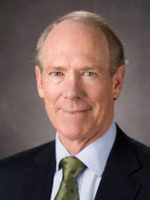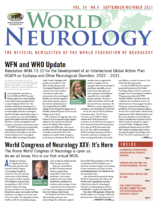
William Carroll, MD
The Rome World Congress of Neurology is upon us. As we all know, this is our first virtual WCN.
Although not in Rome, it is significantly Rome-flavored. Attendees will enter the World Congress of Neurology through the colosseum. From the opening e-Spectacular of the Opening Ceremony, it is full of surprises. The mandatory welcome from the presidents of WCN, WFN, and SIN (Italian Neurology Society) recorded in one virtual room formed from green room studios in Milan and Perth is as realistic as if it were done in the one studio. The Opening Ceremony winds up with the outstanding singing voice of Maestro Andrea Bocelli, which he gave pro bono.
Welcome words offered by WCN President Antonio Federico praised those responsible for this virtual production, cited ancient, medieval, and recent Italian and Roman contributors to medicine and neurology. He also communicated an interpretation of a letter of encouragement and hope from His Holiness, Pope Francis.
SIN President Gioacchino Tedeschi offered similar sentiments and acknowledged the enthusiastic support for the WCN from members of SIN. My contribution as WFN president was to thank the Scientific Program and Teaching Course Committees and chairs for their outstanding program to be displayed over the ensuing five days.
I also welcomed the ground-breaking WHA 73.10 Resolution that will see the World Health Organization develop a Global Action Plan for Neurological Disorders, including Epilepsy, which is scheduled for completion by May 2022.
More than 4,000 registrants will join the World Congress of Neurology and hear 10 plenary lectures. They will choose from 77 scientific sessions and 45 teaching courses covering almost every aspect of modern neurology and delivered by 270 faculty. In addition, there will be a total of 31 sessions of free communications and six regional symposia. These will be available on the World Congress of Neurology website for three months after the Congress. Twenty-six teams of four neurologists will contest the Tournament of the Minds virtually. This has required appreciable innovation and care with the selection and incorporation of the questions to be answered by the contestants.
WFN medals and awards will be presented. These include the WFN Medal for Contribution to Neurology (Awardee: Prof. Jerry Mendell), the WFN Medal for Service to International Neurology (Awardee: Prof. Vladimir Hachinski) and the Munsat Award for Contribution to Education in Neurology offered by the AAN and WFN (Awardee: Prof. Erich Schmutzhard).
Two new WFN awards will be made. The inaugural recipients of the WFN Meritorious Service Awards are Keith Newton, BA (Hons), and Prof. Donna Bergen.
A World Congress of Neurology is a biennial event, and as such is two years in the making. A large number of people, committees, and meetings, combined with a unified purposeful intent are required. For the WFN, and to some extent for its professional conference organizer, Kenes International, the effort required was greater than usual.
All of those associated with the planning and implementation of this virtual XXV WCN wish all those attending an enjoyable, memorable, and above all, rewarding XXV WCN. On behalf of the WFN, I thank them for the outstanding product of their efforts. •
William Carroll
President, World Federation of Neurology
